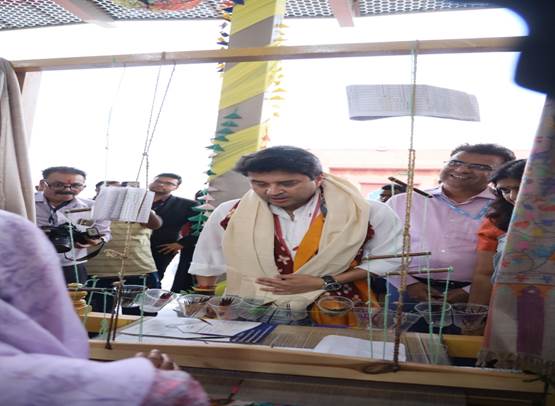The Minister of Communications; and Minister of Development of North Eastern Region Shri. Jyotiraditya M Scindia yesterday visited the vibrant Cultural Corridorwhich has been set up at Bharat Mandapam to share a glimpse of India’s rich heritage with thousands of international delegates participating in the ITU-WTSA 2024. The corridor features exquisite handlooms and handicrafts from various corners of the country, displayed and available for display and purchase at 14 stalls organized by the Ministry of Textiles and Ministry of Development of North eastern Region DONER.



The corridor also highlights technological advancements in the handloom sector, particularly by the Northeastern Region (NER). Delegates can experience India’s technological leadership through its Digital Public Infrastructure (DPI), which facilitates cashless transactions for goods and services during the event via UPI services.
Another notable highlight of technology adoption is a demonstration of NEHHDC’s (North Eastern Handicrafts & Handlooms Development Corporation Ltd) case study on the application of Blockchain for the Traceability of Eri cocoon “fibre to fashion” value chain. NEHHDC is working with LW3 to design and develop Digital Product Passport for handloom sector that uses blockchain technology and unique non cloneable QR codes to create a digital passport for handloom and handicraft products using Eri silk cocoon as sustainable fibre. This passport provides transparency, traceability, and authenticity, ensuring fair trade practices and protecting the intellectual property of artisans and weavers. By recording the product’s journey, chain of custody, and consumer interaction with the artisan and weaverd, LW3 empowers consumers to make informed choices and supports a more ethical and sustainable market for handcrafted goods. The platform also allows artisans to gain social recognition through positive consumer feedback.
Additionally, the corridor features three stalls dedicated to NEHHDC under MoDONER, showcasing handlooms and handicrafts from the Northeastern states. Highlights include the Shaphee Lanphee from Manipur, at the Handlooms of North Eastern Region stall. The Handicrafts of North Eastern Region stall features items like cane sling bags and coin purses by artist Mrs. Keisham Babita Devi from Manipur. Additionally, the Technology Adoption in Handlooms of NER stall showcases Manipuri home textiles by National Awardee Smt. Indira Chirom and provides insight into traditional Manipuri weaving techniques passed down through generations. Textiles crafted on loin looms, throw shuttles, and fly shuttle looms, including Enaphees and Moirangphees, are also on display.
Overall, The Cultural Corridor includes artisans who are National Awardees and skilled craftspeople, presenting a diverse array of handloom and handicraft products from various states, including Kutch shawls and Tangaliya weaves from Gujarat, Manipuri home textiles, Kullu shawls from Himachal Pradesh, and Pochampally Ikat from Telangana.
The visit was a part of the side events of the ongoing WTSA 24 & IMC24 being held in New Delhi. The event marks the beginning of a new chapter in India’s digital journey, reinforcing the country’s commitment to becoming a global leader in advanced communication technologies.
About WTSA 2024:
WTSA 2024, organized by the International Telecommunication Union (ITU), serves as a platform for the development and implementation of global telecommunications standards, uniting regulators, industry leaders, and policymakers to shape the future of communications worldwide.

Comments are closed.